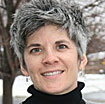Commentary on Psalm 50:1-6
How do you respond to the words, “The boss would like to set up a meeting with you?”
Depending upon both your relationship with the boss and your recent performance at work, you may be one who is encouraged by this imminent meeting. “Finally, a raise!” Or you may get that proverbial pit in the stomach which screams, “Oh oh!”
The announcement that God is approaching as judge yields contrasting responses as well. Not unlike the way we talk about law and gospel in preaching (that is, the very same word can be heard as law to some and gospel to others), the effect of this announcement depends upon the stance of the recipient of such news. For some, the announcement that the mighty one, God the Lord, will appear is a longed-for event. Yet, for others, it is the impetus for trembling. Yes, it is clear that judgment takes center stage in the beginning of this Psalm, but is this welcomed or undesirable judgment? Of course, that depends upon what we know about who is doing the judging and, secondly, who is being judged.
Before exploring these two areas (who is doing the judging and who is being judged), it is important to be aware that the remaining seventeen verses of Psalm 50 contain a speech made by God. Prior to God’s actual speech, however, there is an introduction to the keynote speaker. The pericope we have before us this week (verses 1-6) is the introduction. From this introduction alone, what do we find out about the one who is doing the judging?
We discover right away that the one who is about to speak is mighty. Also, one cannot miss the point that God is being introduced as one who is extremely verbal. In these few verses alone, we discover that God speaks, summons, does not keep silent, and calls. This is not a God who wishes to speak through others or remain distant. Rather, God brings news directly. God is God’s own herald.
In addition, there are two other characteristics of the forthcoming speaker worthy of the preacher’s exploration. First, God comes out of the perfection of beauty, and second, God comes with some special effects; surrounded by devouring fire and encircled by a mighty tempest. Because the reputation and character of the one who speaks makes a difference in how that one is heard, it is worth exploring these characteristics. Even more, consider the extent to which these characteristics of God are consistent with the characteristics you or others in your congregation would highlight when introducing God. (That is assuming God is the planned keynote speaker for this Transfiguration Sunday!)
Not only do these characteristics speak of who God is, but the heavens chime in to put in their good word. One cannot find a more trustworthy witness. The one who is about to speak comes with stellar recommendations. The forthcoming theophany is not to be missed; indeed, cannot be missed.
Another way to discover whether or not the impending judgment is welcome or undesirable is by examining who is being judged. First, we hear that God summons the whole earth. Interestingly, the breadth of this summons is not described (as some translations would suggest) in spatial terms, but temporal. God does not beckon people from the East and West, North and South, but instead, all people for all time, past, present, and future, from the rising of the sun to its setting. Therefore, immediately in the Psalm, we in the twenty-first century are drawn into this text. The stage is being set for a broadcast in its broadest sense, for no one is excluded or exempt from the forthcoming judgment.
Eventually, however, we find that the intended audience is narrowed (verse 5). God appears to be calling specifically to God’s faithful ones, the ones who made a covenant with God by sacrifice. We still do not know whether or not God’s people have been faithful in their covenant with God. (It is worth noting, however, that God did not call them “unfaithful ones.”) All we know is that the hearers being summoned will have one role, and that role will be to listen.
If Psalm 50 were to be the focal point for the Sunday sermon, the Psalm would have to be treated in its entirety. It seems, however, that Transfiguration Sunday calls for this pericope to serve the sermon as it does the remainder of the Psalm. In other words, it acts as an introduction to a forthcoming appearance by God. Not only is Psalm 50:1-6 a suitable precursor to the theophany in Mark 9, the questions and concerns that arise out of this text might be appropriated in order to explore the Transfiguration of Jesus.

February 22, 2009